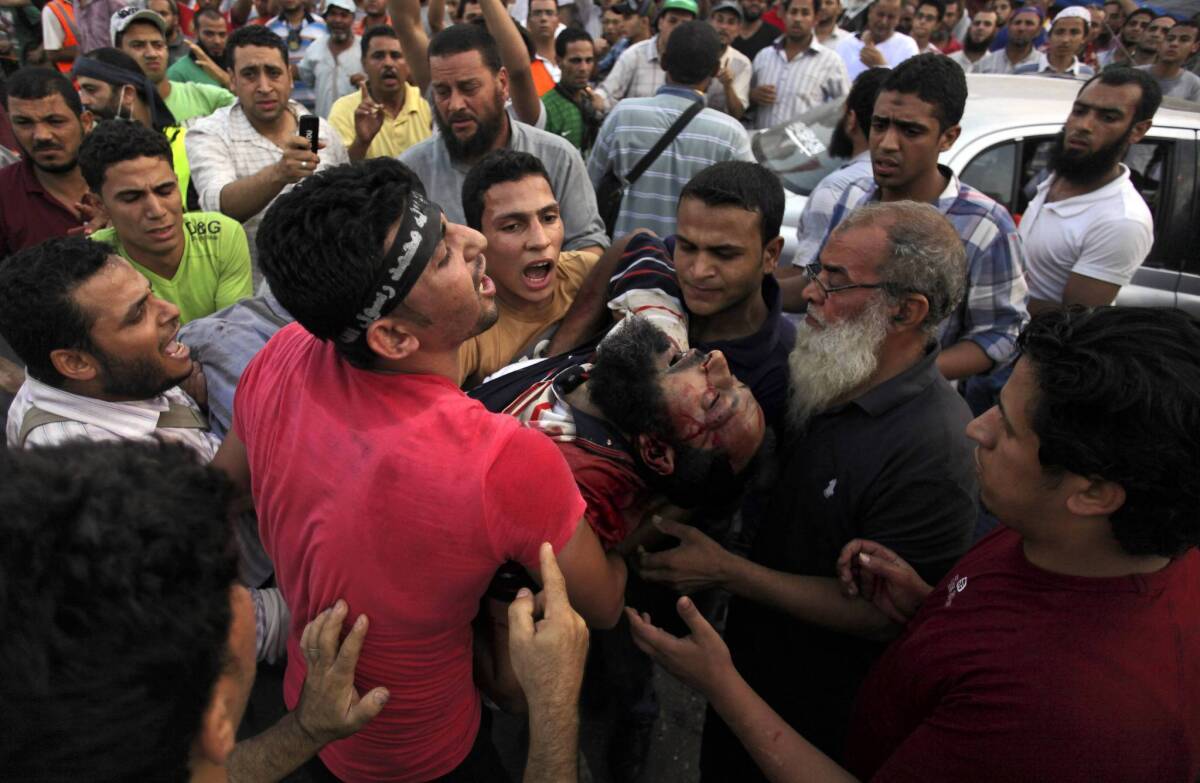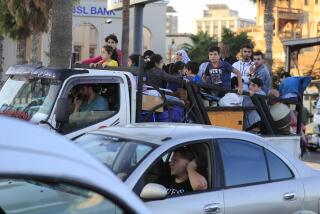Bloodshed rises in streets of Egypt

- Share via
CAIRO — Doctors rushed over floors scattered with bandages as the dead, covered with blood-drenched sheets, were identified by relatives in a makeshift hospital. The bodies were carried toward streets filled with mourners in a nation slipping deeper into violence.
The call to prayer pierced the sky and faded as thousands of Islamists, many tending wounds, prostrated in front of the Rabaa al Adawiya mosque, site of a monthlong sit-in. Worshipers whispered of vengeance and pictures of the newly fallen fluttered in the sun.
This was Cairo on a scorching Saturday after predawn clashes in which the Health Ministry reported that at least 80 people, mostly supporters of deposed President Mohamed Morsi and his Muslim Brotherhood movement, had been killed by police and civilian gunmen.
The ferocity of those hours spoke to an Egypt that appears to be coming undone. The deaths suggested a perilous turning point in a struggle between Islamists and the new military-backed government over the country’s political destiny. Morsi was overthrown in a coup on July 3 and his supporters are demanding his reinstatement.
The killings stoked resolve among the Brotherhood but they also illustrated the narrowing options the group faces against a military that claims a popular mandate to stem “violence and terrorism.”
The army has vowed to end the demonstration at the mosque soon, which may ignite more bloodshed at a time that foreign capitals are increasingly worried about Egypt’s trajectory.
“We must live in dignity or die trying to get it,” said Moataz Moussa, standing near the barricades. “They call us terrorists but we are not. We have only stones against the army’s weapons.”
The military is seeking to crush the Muslim Brotherhood, which over the last two years rose from an outlawed opposition group to Egypt’s dominant political force. The campaign of Gen. Abdel Fattah Sisi, commander of the armed forces, against Islamists mirrors the harsh tactics of other former military leaders, including President Gamal Abdel Nasser and Hosni Mubarak, who was ousted in a 2011 uprising.
“This is not about being a Brotherhood member or not. We just want freedom and justice,” said Ahmed Wahba, a burly man whose shirt was wet with sweat. “We stood in line for hours last year to vote for a new democracy. But what good has it done us? Democracy is down the toilet. This is a bloody coup.”
There are conflicting reports of what happened to Wahba’s compatriots between midnight and daybreak Saturday.
Interior Minister Mohamed Ibrahim said security forces fired tear gas to stop Morsi supporters from blocking the 6th of October Bridge, a key Cairo thoroughfare. The police responded, he said, after Morsi’s followers marched toward the bridge from the Rabaa al Adawiya mosque.
Ibrahim did not explicitly say whether security forces fired other weapons. He said, however, that “the police have not and will not aim any firearm at the chest of any protester.”
The general prosecutor’s office said that Morsi supporters fired at police first. The state news agency reported that the pro-Morsi “crowd attacked security forces with shotguns, pistols and Molotov cocktails.”
That account differs from the version told by Brotherhood members, wounded protesters and doctors in the field hospital near the mosque. They say 120 people were killed, many of them by live ammunition, when police and unknown gunmen, including snipers, attacked peaceful protesters in clashes that intensified through the night.
“The early injuries we saw were mostly from tear gas. Then, a little later, we treated birdshot wounds,” said Dr. Esam Arafa, who volunteered at the field hospital. “But around 2 a.m. there was a terrifying escalation. We saw injuries from live bullets. Protesters were shot in the chest, head and eyes. I’ve seen no less than 1,000 wounded patients.”
The field hospital radiated fatigue and sorrow. The wounded and the dead were ferried in by trucks, cars and motorcycles. Medical supplies were quickly unpacked; stitches were counted, birdshot plucked from skin. Women wept and men parted to make way for television cameras and corpses carried from a room that served as a morgue.
“I saw things I didn’t want to see,” said one man.
“The world must know this,” said another.
“We are Egyptians,” said a third.
By late morning, rubber gloves streaked with blood littered the floor and the stench of death began to rise.
“It was never this bloody before,” said Arafa. “We are at war.”
The early gunshot wounds “were mostly in the legs, but later on they targeted the chest and upper body,” said Dr. Fadwa Rouby, a forensic specialist. “I can’t imagine what will happen in this country next. The young people are very aware of what’s happening. No matter how many of them are killed, there will be others to come and liberate Egypt from the army.”
The summer heat rose. The field hospital and the mosque were flanked by thousands of Islamists. Babies cried, hot plates glowed in tents, fans whirred in shrinking shade. Boys sold shirts and tea; a breeze blew past hammered shacks of wood and cloth. Posters of Morsi billowed near the makeshift stage where an endless loop of preachers sought to inspire.
“God is great,” they said.
“The people want the execution of Sisi,” one cleric yelled. “The people want the execution of the butcher.”
Abu Shaeshae held up a picture of his daughter, Hala, who was shot three times and died Friday. Men and boys pressed in to listen. “My daughter was martyred,” he said. “The last thing she wrote on the Internet was that our need for martyrdom is stronger than our love of life.”
The men nodded.
The air was seared with tear gas and men stood guard at barricades of cobbled stones, watching soldiers and police, who hunkered in the distance beyond burned cars and pink flowers laid on a ragged road to mark where the dead fell.
“We are not willing to go back to the time of Mubarak,” said Marwan Ghanem, a college graduate who works in a wheat mill. “It is better for us to die, even by the thousands.”
A line of angry men stood on the other side of the barricades with police and soldiers, cursing the likes of Ghanem. The two sides were separated by about 300 yards but the distance seemed much greater. The men stopped a minivan with shot-out windows. Nervous doctors sat inside, telling the men they were volunteering to help wounded Islamists.
They needed to pass. More men surrounded the van and voices turned gruff. The engine started. The van eased forward.
A young man poked his head through a broken window and spat in a doctor’s face. The van sped off and the men returned to a street scattered with stones and trash fires.
Special correspondent Ingy Hassieb contributed to this report.
More to Read
Sign up for Essential California
The most important California stories and recommendations in your inbox every morning.
You may occasionally receive promotional content from the Los Angeles Times.











